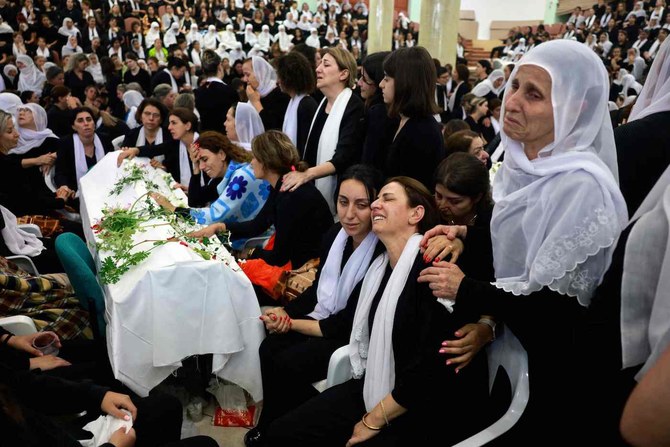BEIRUT: Lebanon on Sunday called for an international investigation into a strike that killed 12 people, including children, in the Israeli-annexed Golan Heights, warning against a large-scale retaliation.
Hezbollah rejected Israel’s accusation of bombing Majdal Shams on Saturday, saying in a statement that “the Islamic Resistance has nothing to do with the incident at all, and we categorically deny all the false claims in this regard.”
After Hezbollah’s statement, Walid Jumblatt, former head of the Progressive Socialist Party — the most powerful Druze leader in Lebanon — warned against “what the Israeli enemy is doing to ignite strife, fragment the region, and target its various communities.”
His warning came as Israel on Sunday morning carried out intense raids on the villages of Al-Abbassieh and Burj Al-Shamali near Tyre, southern Lebanon, causing widespread destruction.
It also raided the border villages of Tayr Harfa and Khiam, and targeted a residential building in Taraya, central Bekaa, with two missiles, destroying the building but causing no casualties.
The attack in Majdal Shams came hours after a raid by Israel on the southern border village of Kfarkila, in which four Hezbollah members were killed.
In a statement, the Lebanese government condemned “all acts of violence and attacks against all civilians,” adding that “targeting civilians is a flagrant violation of international law and contradicts the principles of humanity.”
It called for an “immediate cessation of hostilities on all fronts.”
Foreign Minister Abdullah Bou Habib said in a statement on Sunday that “since the beginning of the war, Hezbollah has been targeting military sites and not civilians, and I don’t think that it carried out this attack in Majdal Shams.”
He added: “It might be planned by other organizations ... an Israeli mistake or even an error on Hezbollah’s part, I don’t know. We need international investigation to uncover the truth.”
In a joint statement, UN Special Coordinator for Lebanon Jeanine Hennis-Plasschaert and UNIFIL head of mission and force commander Lt. Gen. Aroldo Lazaro condemned “the death of civilians, including young children and teenagers, in Majdal Shams,” stressing that “civilians must be protected at all times.”
They urged “the parties to exercise maximum restraint and to put a stop to the ongoing intensified exchanges of fire, as they could ignite a wider conflagration that would engulf the entire region in a catastrophe beyond belief.”
The UN special coordinator held a phone call with Parliament Speaker Nabih Berri, who is considered the most important channel of communication with Hezbollah.
According to his press office, Berri affirmed that “Lebanon and its resistance are committed to UN Resolution 1701 and the rules of engagement by refraining from targeting civilians.”
Berri added that “the resistance’s denial of involvement in the Majdal Shams incident strongly reaffirms this commitment and underscores that neither Lebanon nor the resistance is responsible for what happened.”
UNIFIL spokesperson Andrea Tenenti said his organization was in contact with the parties to diffuse the tension.
Jumblatt received a phone call from the US mediator to the Middle East, Amos Hochstein, who expressed concern over the escalating situation on the southern Lebanese front after the Majdal Shams incident.
Jumblatt tried to diffuse the situation, since most of the Majdal Shams’ residents are Druze.
He said that “targeting civilians is rejected and condemned, be it in occupied Palestine, the occupied Golan, or in southern Lebanon,” adding that “the history of the Israeli enemy is filled with massacres against civilians.”
Activists and supporters on TV channels and social media platforms denied Hezbollah’s involvement in the Majdal Shams attack, noting that “there are no settlers in Majdal Shams for the party to target, and it knows that.”
Hezbollah’s denial was to no avail, as the Israeli army insisted on holding the party responsible for launching the rocket.
Israeli army spokesman Avichay Adraee said: “Ali Mohammed Yahya, the commander of the launch complex in the Shebaa area, ordered the firing of rockets toward the village of Majdal Shams.”
The Israeli raids on Lebanon on Sunday caused enormous destruction but did not result in any human casualties. The raids targeted two large hangars in Al-Abbassieh and Burj Al-Shemali.
The regular raids on the area since the start of hostilities between Hezbollah and the Israeli army have caused panic among residents, damaging dozens of houses and apartments.
A Lebanese security source said: “Seven Israeli warplanes carried out the raids simultaneously.”
Adraee claimed that the raids hit Hezbollah targets in seven different areas across Lebanon, deep into Lebanon and its south, including weapons depots and infrastructure.
Hezbollah responded to the attacks by targeting “the positioning of Israeli soldiers in the Manara settlement,” according to a statement from the party.
Israeli officials on Sunday continued to vow to make Hezbollah pay.
Defense Minister Yoav Gallant said: “This is a very difficult and painful event for these children. It is a terrible tragedy. Hezbollah is responsible for this and it will pay.”
Gallant was speaking during a visit to Majdal Shams, where funeral processions were held for its victims.
Israeli Chief of Staff Gen. Herzi Halevi visited Majdal Shams on Saturday evening, according to Adraee.
Gen. Halevi inspected the football field that was hit, confirming the readiness for the next phase of combat in the north.
“We know exactly where the rocket was fired from,” he said. “We examined the remnants of the rocket on the walls of the football field here.
“We can say it was a Falaq rocket with a warhead weighing 53 kg. This is a Hezbollah rocket. Whoever fires such a rocket toward a populated area intends to kill civilians, intends to kill children.”
Reuters reported, citing two security sources, that Hezbollah “is on high alert and has evacuated some key sites in eastern and southern Lebanon.”
France and Norway called on their citizens “to avoid traveling to Lebanon and Israel” and asked those in the country to leave Lebanon.


























